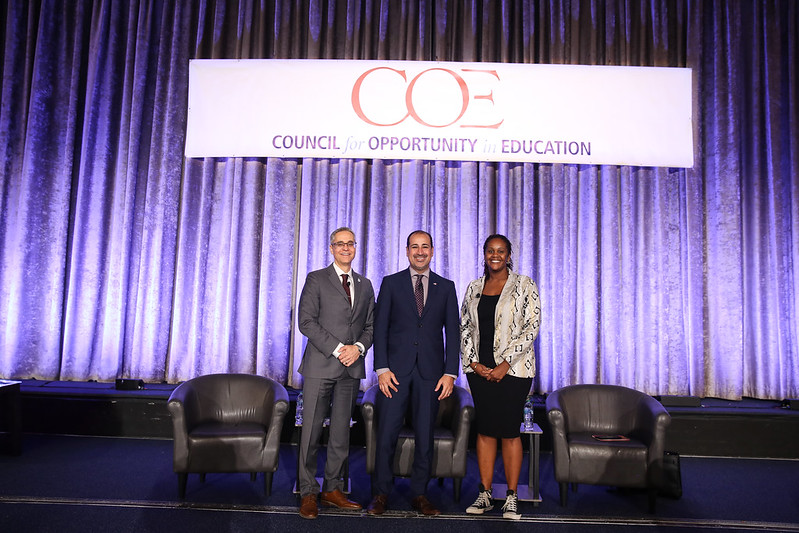Data’s Role in Shaping Education Policy Highlighted at COE Conference
October 16, 2024 — by Terrance L. Hamm

New York, NY – To close the 2024 Council for Opportunity in Education (COE) Annual Conference, experts from the U.S. Department of Education and Axim Collaborative explored the power of data in driving educational outcomes for TRIO students. The session, titled “From Data to Deliverables: Leveraging Program Performance Data to Inform Policy and Practice,” focused on how four decades of TRIO data can be used not just for annual performance reports but also to shape policy at the national, state, and institutional levels.
Aaron Brown, executive vice President of COE and a TRIO Student Support Services alumnus, moderated the discussion by emphasizing the potential of TRIO data. “This data holds the promise of far greater impact. It can address broader questions surrounding college access and success for low-income, first-generation students,” said Brown.
The session featured insights from Roberto Rodriguez, assistant secretary for planning, evaluation, and policy development at the U.S. Department of Education, and Stephanie Miller. Miller is vice president of data and Impact at Axim Collaborative, a former Pell Institute research associate, and an alumna of TRIO’s Upward Bound Math-Science and McNair programs.
Rodriguez shared his connection to TRIO, recalling his early days as a staff member of Upward Bound. He highlighted the significance of the data collected through TRIO’s Annual Performance Reports (APRs) in shaping federal policy. “TRIO has such a rich history backed by data… this data helps us understand not only how our students are progressing but also how TRIO is making a difference in their lives.”
With over 20 years of experience in data science, Stephanie Miller echoed the importance of data in telling the full TRIO story. “TRIO has figured out the perfect pathways to help students succeed,” she noted. “Data helps us understand academic performance and the personal connections and opportunities that make the TRIO experience so powerful.”
The discussion centered around how TRIO’s data can be linked with other large-scale data sets, such as the National Student Clearinghouse and unemployment insurance wage data, to get a fuller picture of students’ post-graduation outcomes. “We need to tap into these resources to understand our students better—what they face, where they live, and how we can help them succeed,” said Rodriguez.
One of the session’s key takeaways was the emphasis on storytelling through data. Miller highlighted the importance of using data to craft compelling narratives that can influence policymakers. “Politicians want to know the return on investment,” she said. “Using data to tell powerful stories that show TRIO’s success is critical.”
Both panelists stressed that TRIO professionals must move beyond merely reporting data to actively using it for program improvement. “We don’t use that data enough for program improvement,” Rodriguez said, urging attendees to dig deeper into their local data to enhance the quality of their programs.
In closing, Brown emphasized the potential of data to secure TRIO’s future. “The more we can harness the power of data, the better equipped we’ll be to advocate for the resources and support our students need.”
More News & Impact
-
Blog
U.S. Representative Adriano Espaillat Addresses Diversity and Education at COE Annual Conference
by Terrance L. Hamm
-
Blog
Balancing Acts: 2024 Wolanin Intern and Mother of Four Recalls Her Journey to Capitol Hill
by Ni’Aisha Banks
-
Blog
Demystifying Graduate School: A Guide for First-Gen BIPOC and Nontraditional Students
by Yvette Martinez-Vu and Miroslava Chavez-Garcia
-
Blog
Empowering Excellence: A TRIO Program’s Journey to Streamlined Success with empower™
by Terrance L. Hamm
-
Blog
Unleashing the Roar: A STEAM Symposium in Celebration of the Jurassic Park 30th Anniversary
by Trauvello Stevenson
-
Blog
Breaking Barriers in Finance: The Impact of TRIO on Student Support Services Alumna Ashley Thomas
by Holly Hexter, Neve Dole
-
Blog
Research Reveals Ways to Improve Mental Health Support for First-Generation Students
by Holly Hexter
-
Blog
Mason Award and TRIO Family Award Winners Celebrate Lives Changed for the Better
by Maura Casey
-